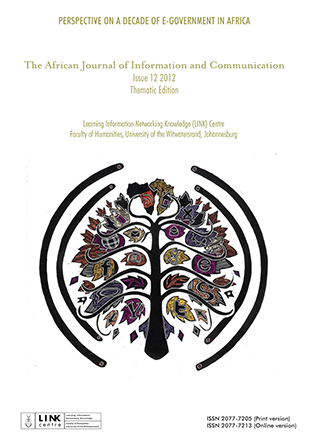SERVQUAL as a Socio-Technical Approach to Measuring e-Government Service Quality and Guiding e-Governance Strategies
DOI:
https://doi.org/10.23962/10539/19710Keywords:
e-government service quality, e-governance strategies, measurement, socio-technical approachAbstract
e-Government services and e-governance have been embraced in many African countries. Nonetheless, measuring the value of e-government remains a challenge. Key to a successful evaluation of progress towards e-governance is the contextual approach, in which ICT is embedded as part of a holistic solution to governance. When carried through without considering the complementary influences of society on ICT and of ICT on society, e-government services can lead to little added value, or even to an exacerbation of societal problems and lack of progress towards e-governance. Although much has been written on e-governance in Africa, few authors have extended the discussion to measuring quality of service and lack of progress towards egovernance. In South Africa, the Batho Pele (People First) policy of service quality is the contextual approach within which e-governance is embedded, because of its good governance attributes. This article relates Batho Pele to SERVQUAL, a framework widely used to measure customer service quality in the retail sector, and adapts the framework for measuring service quality in community e-government service centres, known as Thusong Service Centres (TSC). The analysis, using Structural Equation Modeling (SEM), is consistent with what is known: service quality in TSCs is low and requires regular measurement and evaluation to inform future quality improvements. The article argues that an adapted SERVQUAL instrument, taking into account Batho Pele principles and situational context, can be used as a guide to innovation in e-government service delivery. It is an appropriate sociotechnical tool to collect data to inform e-governance strategies in African countries which share the same social context as South Africa.
References
Anderson, J. & Gerbing, D. (1988). Structural equation modeling in practice: A review and recommended two-step approach. Psychological Bulletin, 103(3), p. 411. https://doi.org/10.1037/0033-2909.103.3.411
Becker, J., Niehaves, B., Poeppelbuss, J. & Simons, A. (2010). Maturity models in IS research. Paper presented at the 18th European Conference on Information Systems, Pretoria.
Buttle, F. (1996). SERVQUAL: Review, critique, research agenda. European Journal of Marketing, 30(1), pp. 8-32. https://doi.org/10.1108/03090569610105762
Carter, L., Zhang, J. & Schaupp, L. (2012). e-Government services and information, Electronic Government Minitrack. Paper presented at HICSS-45 conference, 4-7 January 2012, Maui. https://doi.org/10.1109/HICSS.2012.219
Dwivedi, Y., Weerakkody, V. & Janssen, M. (2011). Moving towards maturity: Challenges to successful e-government implementation and diffusion. Database for Advances in Information Systems, 42(4), pp. 11-22. https://doi.org/10.1145/2069090.2069093
GITOC (2009). Government-wide enterprise architecture (GWEA) framework revision 1.2, retrieved 18 September 2011 from http://www.gitoc.gov.za.
Lee, J. (2010). 10 year retrospect on stage models of e-government: A qualitative meta-synthesis. Government Information Quarterly, in press, corrected proof. https://doi.org/10.1016/j.giq.2010.05.006
Lewis, R. & Booms, B. (1983). The marketing aspects of service quality, In Berry, L., Shostack, G. & Upah, G. (eds). Emerging perspectives on services marketing, American Marketing Association, Chicago, pp. 99-107.
Moorman, R., Blakely, G. & Niehoff, B. (1998). Does perceived organizational support mediate the relationship between procedural justice and organizational citizenship behaviour? Academy of Management Journal, pp. 351-357. https://doi.org/10.5465/256913
Muylkens, M. (2010). National e-strategies for development: Global status and perspectives 2010. Paper presented at the World Summit on the Information Society, Geneva, Switzerland.
Parasuraman, A., Zeithaml, V. & Berry, L. (1994). Alternative scales for measuring service quality: A comparative assessment based on psychometric and diagnostic criteria. Journal of Retailing, 70(3), pp. 201-230. https://doi.org/10.1016/0022-4359(94)90033-7
Parasuraman, A., Zeithaml, V. & Berry, L. (1988). SERVQUAL: A multiple-item scale for measuring consumer perceptions of service quality. Journal of Retailing, 64(1), pp. 12-40.
Republic of South Africa (2007). Thusong Service Centre: Business Plan 2006-2014, retrieved 04 November 2007 from http://www.thusong.gov.za/documents/establish_rollout/index.jsp.
Republic of South Africa (2001). Electronic government: The digital future – A public service IT policy framework. Department of Public Service and Administration, Pretoria.
Republic of South Africa (1997). Batho Pele – “People First”. White Paper on Transforming public service delivery, 18 September 1997, Department of Public Service and Administration, Pretoria.
Twinomurinzi, H. & Rambau, N. (2012). Slow but steady progress versus leap frogging: An e-government dilemma in Africa. Paper presented at the 4th Annual International Conference on ICT for Africa: Africa’s e-inclusion: Defying the odds and leading the way in global ICT innovation, 21-24 March 2012, Makerere University Business School, Kampala.
Zeithaml, V., Parasuraman, A. & Berry, L. (1990). Delivering quality service: Balancing customer perceptions and expectations. Free Press, Collier Macmillan, London and New York. https://doi.org/10.1111/j.1365-2648.2006.03721.x
Zimmer, L. (2006). Qualitative meta-synthesis: A question of dialoguing with texts. Journal of Advanced Nursing, 53(3), pp. 311-318.
Downloads
Published
Issue
Section
License
Copyright (c) 2012 https://creativecommons.org/licenses/by/4.0

This work is licensed under a Creative Commons Attribution 4.0 International License.
How to Cite
- Abstract 221
- pdf 109


.png)